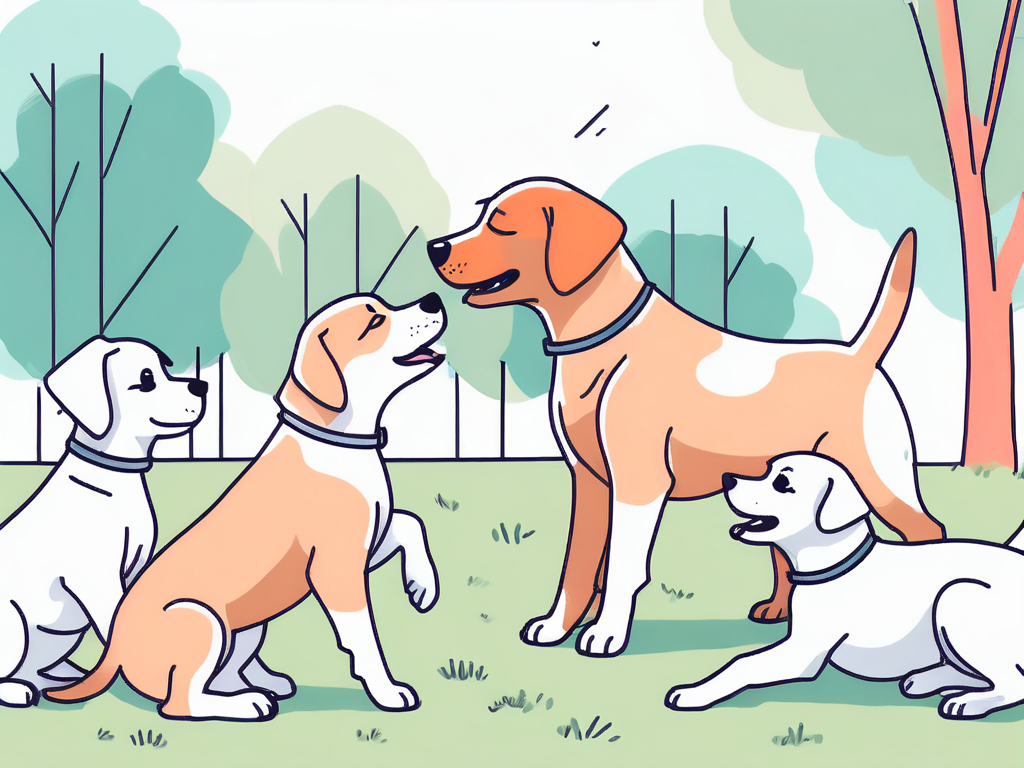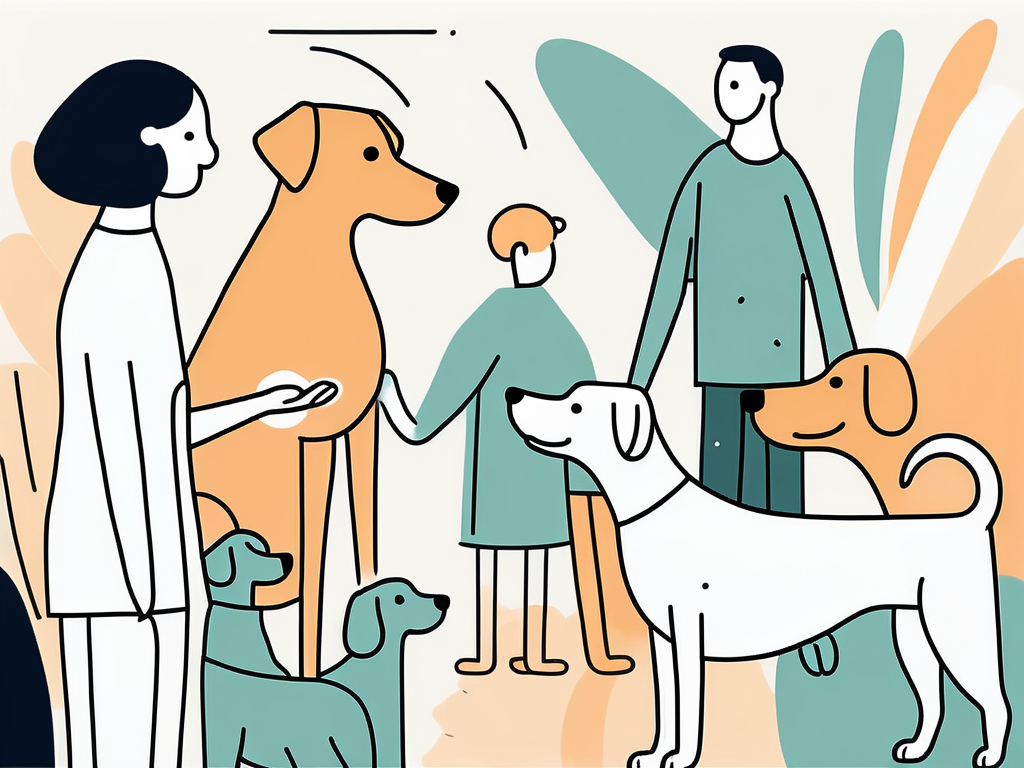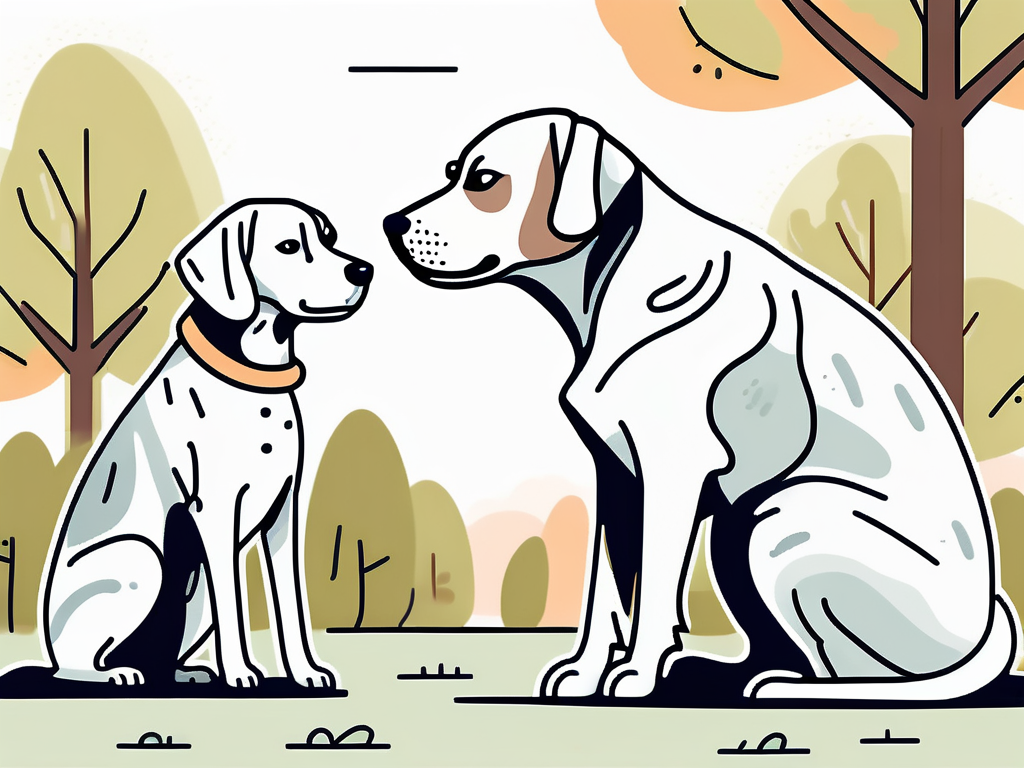How to Socialize Your Dog: A Comprehensive Guide

How to Socialize Your Dog: A Comprehensive Guide
If you're a dog owner, you know just how important it is to have a well-socialized furry friend. Not only does it make your life easier, but it also ensures that your dog lives a happy and fulfilling life. In this comprehensive guide, we will delve into the world of dog socialization and explore all the tips and tricks you need to know to have a well-rounded canine companion.
Understanding the Importance of Socializing Your Dog
Before we jump into the how-tos, let's take a moment to understand why socializing your dog is crucial. A well-socialized pup is more confident, less anxious, and overall a joy to be around. They can handle new situations and environments with ease, making them adaptable to any adventure life throws their way. Additionally, proper socialization can prevent behavior issues down the road, such as aggression or fearfulness. So, let's dive into the benefits of having a well-socialized dog and some potential issues that can arise when socialization is lacking.
The Benefits of a Well-Socialized Dog
A well-socialized dog is a well-adjusted dog. They are comfortable in various social settings and can interact with people and other animals in a calm and friendly manner. This makes walks in the park or visits to the vet a breeze! Another benefit is that socialized dogs are less likely to develop behavior problems, like separation anxiety or destructive chewing. Socialization also helps build your dog's confidence, which in turn makes training easier. So, you're not only helping your dog, but you're also setting yourself up for success as a pet owner.
Imagine taking your well-socialized dog to a bustling outdoor cafe. As you sit at a table, enjoying a cup of coffee, your furry companion calmly lies down beside you, unfazed by the noise and activity around them. Passersby can't help but admire your well-behaved pup, and you feel a sense of pride knowing that your dog's socialization efforts have paid off.
Potential Issues with Unsociable Dogs
On the flip side, dogs that lack socialization may struggle in different situations. They might become fearful or anxious, leading to aggressive behavior or high levels of stress. Unsocialized dogs can also have difficulty adjusting to new environments, making everyday activities difficult for both the dog and the owner. Additionally, these dogs may not understand how to properly interact with other dogs or humans, leading to awkward or even dangerous encounters. It's essential to address these issues early on through proper socialization.
Picture this: you're walking your unsocialized dog in the neighborhood, and as another dog approaches, your furry friend starts barking uncontrollably, pulling on the leash, and displaying signs of fear. The other dog's owner looks concerned, and you feel embarrassed and frustrated. This scenario could have been avoided with proper socialization, allowing your dog to greet other dogs calmly and confidently, creating a positive experience for everyone involved.
The Ideal Age to Start Socializing Your Dog
Now that we understand why socialization is vital for dogs, let's tackle when to start the process. The ideal age to begin socializing your pup is during their critical socialization period, which typically occurs between 3 and 14 weeks of age. During this time, puppies are more open to new experiences and are eager to explore the world around them. However, don't worry if you missed this window! Socialization can and should continue throughout your dog's life, and we'll discuss how to tackle that as well.

Puppy Socialization
When it comes to socializing puppies, the key is exposure. Introduce them to as many new people, environments, and situations as possible. Take them for walks in busy areas, let them meet other friendly dogs, and invite new people into your home. However, remember to prioritize their safety and well-being. Avoid overwhelming your puppy with too many stimuli at once and always ensure positive experiences.
During the critical socialization period, it's important to expose your puppy to various sounds, such as vacuum cleaners, doorbells, and car horns. This will help them become accustomed to different noises and prevent them from developing fear or anxiety later in life. Additionally, consider taking your puppy to different types of surfaces, such as grass, sand, and pavement. This will help them build confidence and adaptability.
Socializing Adult Dogs
If you have an adult dog that hasn't received much socialization, don't worry—it's never too late to start! Begin with small steps and gradually expose them to new experiences. Start by inviting friends or family members over to meet your dog, making sure they have a positive and calm demeanor. As your dog becomes more comfortable, you can venture out to new environments and introduce them to well-behaved dogs. The key is to be patient and take things at your dog's pace.
When socializing an adult dog, it's important to address any existing behavioral issues they may have. If your dog displays fear or aggression towards certain stimuli, consider seeking the help of a professional dog trainer or behaviorist. They can provide guidance and create a tailored socialization plan to help your dog overcome their fears and develop positive associations.
Remember, socialization is an ongoing process. Even if your dog is well-socialized as a puppy or has made progress as an adult, it's important to continue exposing them to new experiences throughout their life. This can include attending dog-friendly events, participating in obedience classes, or even going on adventures to new places. By consistently providing positive socialization opportunities, you'll help your dog become a well-rounded and confident companion.
Basic Principles of Dog Socialization
Now that you know when to start socializing your dog, let's delve into some fundamental principles to keep in mind during the process.
Socializing your dog is a crucial aspect of their overall well-being and development. It not only helps them feel more comfortable in various situations but also strengthens the bond between you and your furry companion. Understanding the basic principles of dog socialization can make the process smoother and more enjoyable for both you and your dog.
Gradual Exposure
Socialization should happen gradually and at a comfortable pace for your dog. Start with low-stress situations and gradually increase the level of exposure. For example, if you're introducing your dog to a new environment, start by spending a few minutes there and gradually extend the duration of each visit. This gradual approach will help your dog feel secure and build their confidence.
It's important to pay attention to your dog's body language during socialization. Watch for signs of stress or discomfort, such as panting, pacing, or avoidance behaviors. If you notice these signs, take a step back and give your dog some space to relax before continuing the socialization process. By being attuned to your dog's needs, you can ensure that the experience is positive and beneficial for them.
Positive Reinforcement
When it comes to socializing your dog, positive reinforcement is key. Reward your dog for good behavior and reactions with treats, praise, and playtime. This positive association will help them understand that new experiences and encounters are a positive thing. Remember to be patient and consistent in your training methods—your dog will appreciate it!
In addition to using treats and praise as rewards, you can also incorporate socialization into your dog's daily routine. Take them for walks in different environments, introduce them to new people and animals, and engage them in interactive play sessions. The more varied experiences your dog has, the more well-rounded and adaptable they will become.
Socializing Your Dog with Humans
Interacting with humans is an essential aspect of socializing your dog. Here are some tips and tricks to ensure smooth and positive interactions.

Introducing New People
When introducing your dog to new people, it's important to create a calm and stress-free environment. Allow your dog to approach the person at their own pace, and ensure the person understands how to calmly interact with dogs. Avoid overwhelming your dog with too many new people at once, as this can lead to anxiety. Remember, slow and steady wins the race!
Handling Different Human Behaviors
It's essential to expose your dog to various human behaviors to prepare them for real-life situations. For example, teach your dog to be comfortable with gentle petting, loud noises, or different types of clothing. The more exposure your dog has to different stimuli, the more adaptable they will become. Spice things up and have fun while training!
Socializing Your Dog with Other Dogs
Interacting with their fellow canines is another crucial aspect of your dog's socialization. Let's explore some techniques and considerations when socializing your dog with other dogs.

Dog Park Etiquette
Dog parks can be a great place for your dog to socialize with other pups, but it's essential to follow proper etiquette. Always supervise your dog and ensure they are playing nicely with others. Avoid bringing an unsocialized or aggressive dog to the park, as this can lead to conflicts. Regularly monitor your dog's behavior and intervene if necessary.
Dealing with Aggressive Dogs
If your dog encounters an aggressive dog during socialization, it's essential to know how to handle the situation. Stay calm and remove your dog from the situation, focusing on your dog's safety. Make note of any triggers or patterns to avoid similar encounters in the future. If the aggressive behavior persists, consult a professional dog trainer for guidance.
Socializing your dog is a rewarding journey that will strengthen the bond between you and your furry friend. Remember to take it one step at a time, celebrate small wins, and make the process a positive and fun experience for both of you. With dedication and patience, your dog will become a well-socialized superstar, ready to take on any social situation with ease!


